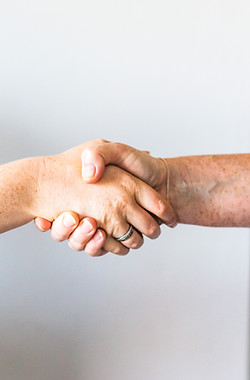
interfaith partnership against
domestic violence and elder abuse
National Domestic Violence Hotline
800-799-7233 (SAFE)
National Sexual Assault Hotline
800-656-4673 (HOPE)

What is Elder Abuse?
Elder abuse is a pattern of power and control that includes physical, sexual, emotional, psychological, verbal, financial, and spiritual abuse. The perpetrator can be a family member, close friend, neighbor, adult child or grandchild, caretaker, someone in a position of authority, or anyone the older adult would normally be expected to trust. Elder abuse can happen in homes, nursing homes, long-term care and assisted living facilities, and hospitals.
1 in 10
older adults has experienced some form of abuse, neglect, or financial exploitation.
1 in 4
older adults with dementia experience some form of abuse.
One study found that elders who experience even modest abuse have a 300% higher risk of death when compared to those unabused.*

“A test of a people is how it behaves toward the old . . . the affection and care for the old . . . [is] the true gold mine of a culture.”
RABBI ABRAHAM JOSHUA HESCHEL
Explore our Resources

Partnering to Address Faith and Safety
We hope this Partnership Guide will catalyze an ongoing conversation in your community about how service providers and faith leaders can build partnerships that support older victims and survivors. This guide includes the wisdom of domestic and sexual violence service providers, faith leaders, survivors, and experts from across the country.
Engaging Faith Communities
on World Elder Abuse
Awareness Day
Everyone deserves to be safe, but how do we provide the resources, training, and information necessary to make each and every faith community across the U.S., the Tribal Nations, and the U.S. Territories a
haven of safety for older adults? Safe Havens collaborated with NCEA to begin to answer this question.

Download our elder abuse resources available in black and white for printing here.

COVID-19 UPDATE
Amid the social isolation brought on by this pandemic, a quiet, unseen tragedy is unfolding for the approximately 1 in 10 older adults who experience physical, emotional, sexual, financial, and spiritual abuse. While physical distancing will slow the virus, isolation is also a risk factor and a weapon of abuse. Like the pandemic itself, abuse is a matter of life and death: older victims are three times more likely to die prematurely than those who are not abused.
For 89% of older adults, faith is a source of strength and resilience. That’s why we are calling on faith communities and faithful people everywhere to increase their efforts to connect with and support older survivors of abuse.
This project was supported by Grant No. 2008-TA-AX-K052 awarded by the Office on Violence Against Women, U.S. Department of Justice. The opinions, findings, conclusions, and recommendations expressed in these publications and program are those of the authors and do not necessarily reflect the views of the Department of Justice, Office on Violence Against Women.


